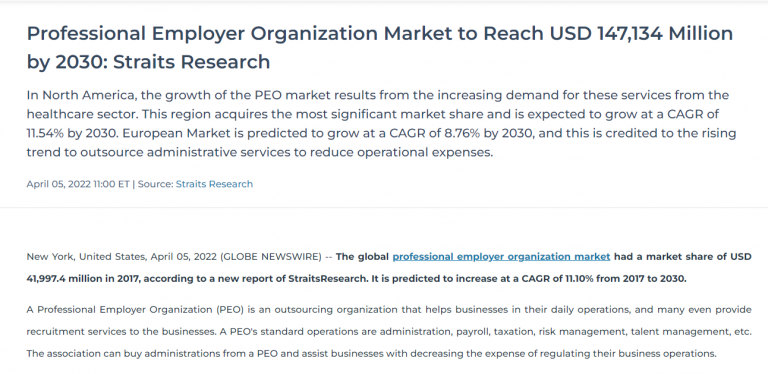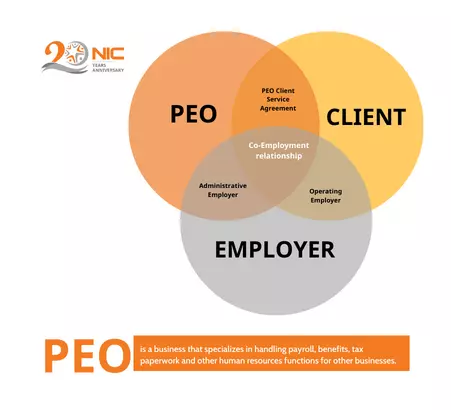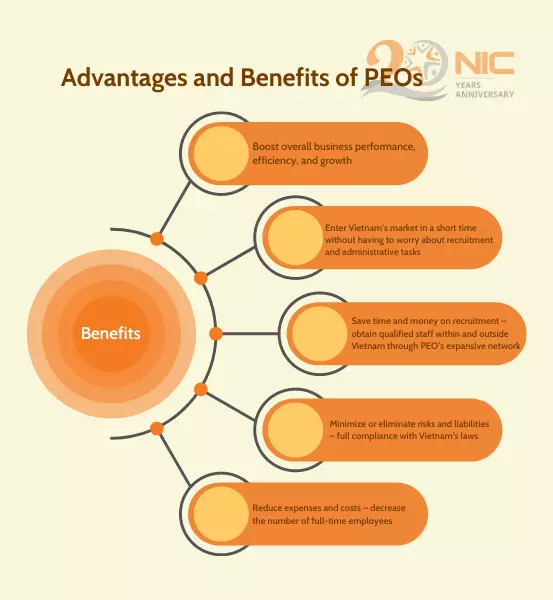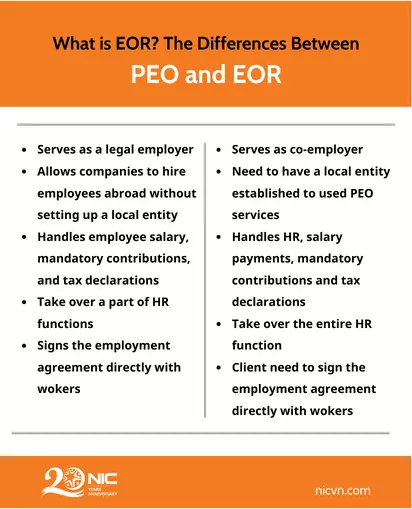
Today is the trend of using PEO services
In recent years, the demand for PEO has increased acorss the whole word. Many large companies have switched from traditional full-time employees to professional employment organizations. With several benefits and flexible options, PEO helps employers get more revenue than before by decreasing employee costs.
Perhaps PEO services in Vietnam are pretty strange, but in the abroad market, it’s a strong growth industry.
According to the Straits Research Report, The global professional employer organization market had a market share of USD 41,997 million in 2017 and is predicted to Reach USD 147,134 Million by 2030. The result has shown the effects of this industry in the new decade market.

The Vietnam labor market is growing fast, so it is attractive for abroad organizations to expand. And if you’re looking to expand your business into Vietnam. In that case, the most accessible, flexible and cost-effective way is using PEO employment or hiring staff under a reputable Professional Employment Organisation (PEO) arrangement.
What is a Professional Employer Organization (PEO)?
PEO stands for Professional Employer Organization. You may have heard PEO services referred to as co-employment, business process outsourcing, or HR outsourcing.
A professional employer organization is a business that specializes in handling payroll, benefits, tax paperwork and other human resources functions for other businesses.
PEOs help you focus on your core business operations, while providing you with the expertise needed to manage your employees and their benefits. Service offerings may vary by PEO, but generally include: Payroll processing, Payroll tax administration, Payroll-related consulting and reporting, Payroll-related legal services, Health and Social Insurance Regulations…

What kinds of businesses benefit from PEOs?
Small and midsized businesses tend to be in co-employment arrangements the most, but larger organizations can also benefit. In fact, PEOs are a good fit for almost all industries, including, but not limited to:
- FMCG industry
- Finance
- Real estate and property management
- Engineering services
- Management consulting services
- Business services
- Manufacturing
- Insurance
Why do you need the PEO in Vietnam
PEO provides convenient services for customers want to recruit employees and manage payroll in Vietnam. We can help you recruit your candidates in compliance with local labor laws and they can be onboarded in days instead of months as it would normally take.
When negotiating the terms of an employment contract and offer letter with an employee in Vietnam, it may be useful to keep the following standard benefits in mind:
The law requires a written labor contract in Vietnam, which clearly outlines the terms of salary, benefits, and termination requirements of the employee. In addition, the contract should include mandatory information such as: social insurance, health insurance; Work location; contract term; training, fostering and improving professional qualifications,
The maximum working hours are 8 hours per day, or 48 hours per week, for normal working conditions. It’s legally required that employers provide employees with 1 full day off per week, which is usually Sunday. In practice, though, most employers stick to the standard eight-hour workday, five days per week schedule (from Monday to Friday).
There are 11 public holidays in Vietnam during which most employees are entitled to the day off work. The Tet Lunar New Year is a week long celebration.
Public holidays are in addition to the vacation days. Public holidays are:
- New Year’s Day – January 1 – 01 day off
- Tết (The Lunar New Year) – from last day of the last lunar month to 5th day of the first lunar month – 05 days off
- Hung Kings Commemorations – 10th day of the 3rd lunar month – 01 day off
- Day of Southern Liberation for National Reunification – April 30 – 01 day off
- International Labour Day – May 1 – 01 day off
- National Day – September 2 and added either September 1st or 3rd from 01 Jan 2021 – 02 days off
If the weekly rest day coincides with a public holiday or Tet holiday specified in Clause 1, Article 112 of the Labor Code, the employee is entitled to a compensatory rest day off on the next working day.
Foreign employees are additionally entitled to a day off with pay on one additional traditional day of their country of origin.
Minimal annual leave requirements of 12 days are stipulated by Vietnamese labor law.
- Employees who have worked for twelve months for an employer are entitled to twelve paid annual leave days, with pro rata entitlement for employees with less than twelve month’s service.
- Employees receive one additional paid vacation day for each additional five years they work for an employer.
- Employees are entitled to pay in lieu of annual leave for leave not taken by the end of the year. In practice normally the Employer agrees to permit the
- Employee to carry over untaken annual leave to the following year, but no later than March 31st of the following year, instead of payment in lieu of untaken leave.
- Employees working under hazardous conditions may earn more leave, and additional leave is often a negotiated supplementary benefit.
- Annual vacation leave is held separately from sick leave or maternity leave in Vietnam.
- Employees are also entitled to paid personal leave for their wedding, the wedding of their child, or the death of a parent, spouse, or child, as well as unpaid leave with the approval of their employer.
Employees who suffer from illness and/or disability or take leave in accordance with a doctor’s order can receive an allowance from Vietnam’s social insurance fund, provided that they submit the required documentation supporting their leave (normally only doctors at the public hospitals can issue this certificate). The sick leave allowance is based on the employee’s salary used to calculate the social insurance premium. The maximum entitlement is:
- 30 days per year (if the employee has contributed to the social insurance fund for less than 15 years) or
- 40 days per year (if the employee has contributed to the social insurance fund for between 15 and 30 years) or
- 60 days per year (if the employee has contributed to the social insurance fund for more than 30 years).
As a female employee, you are eligible for 6 months of paid maternity leave at 100% of your salary (the base salary of the social insurance contribution), and an additional 30 days for each additional child. Your salary during this period will be paid by the compulsory social insurance.
Maternity leave is 6 months. As a pregnant female employee, or one who is on maternity leave or has a child below 12 months of age, you can only be dismissed if the enterprise ceases operation; no other causes for dismissal are recognized.
Maternity leave in Vietnam is 12 weeks long, and during this time, the employer is not required to pay salary to the employee. However, the maternity leave allowance is based on the employee’s salary used to calculate the social insurance premium. The maximum entitlement is: 29.800.000VND. In case the employee’s actual gross salary base is higher than this amount, the employer will pay for the difference.
Fathers are eligible to receive 5 to 14 days of paid paternity leave, depending on whether the child is born naturally or by C-section and whether it is a single or multiple birth.
Basic insurance is provided through the national system.
Employers provide health insurance by law for their employees and must provide regular annual health checks.
In Vietnam, employers are not legally required to provide a 13th month bonus, annual bonus or commission plan. However, most companies do offer some form of bonus to their employees.
The 13th month bonus is typically given to employees who have worked for the company for more than one year, or is prorated based on length of employment. Bonuses are often paid out before the Lunar New Year Holiday, and may range from one month to three months salary.
Various other allowances and bonuses are often negotiated for in Vietnam, and they may or may not be taxable depending on their structure. At Globalization Partners, we advise customers on the total compensation package every step of the way when they use our Global Employer of Record solution.
A 13th month bonus is not legally required in Vietnam, but most employers provide a 13th month bonus, annual bonus or commission plan. The 13th month bonus is typically offered to employees that have worked for a company for more than one year or is prorated based on length of employment. Bonuses are often paid prior to the Lunar New Year Holiday and may range from 1 month to 3 months’ salary.
The employees’ rights when their employment contract is terminated depend on the reason for dismissal and the conditions set out in the employment contract. The effects of this include the notice period and any severance payments that may be applicable.
In Vietnam, it is common practice to have a “probation period” when hiring new employees. This probationary period must not exceed 60 days for work that requires specialized or highly technical skills or 30 days for other types of work.
Vietnam labor code states that an employer may terminate a labor contract by serving advance notice of 30 working days for termination of a fixed term labor contract or 45 working days for an indefinite labor contract. However, employers must have proper legal grounds for termination.
Terminating an employee in Vietnam is not a simple matter. Proper legal grounds must exist in order for an employer to terminate a labor contract with an employee, such as performance issues, prolonged illness, a force majeure event, or dissolution of the company. Employers are required to perform various procedures prior to terminating an employee.
An employer who wrongfully ends an employee’s tenure may be liable for that employee’s salary during the period of unemployment, as well as a penalty of two months’ salary. The best way to avoid this legal issue is to come to a mutual agreement or resignation with the employee, in which case they may be given a severance package.
Statutory Social Insurance in Vietnam applies to enterprises, entities, and organizations that employ employees under indefinite-term or definite-term labor contracts for three months or more. The social insurance fund pays allowances for:
- sick leave
- maternity leave
- work-related accidents
- occupational disease
- pensions.
Vietnam has a compulsory social, health and unemployment insurance scheme. Contributions are to be borne by both the employer and the employee. Calculating the contributions is the monthly salary stipulated in the labor contract (capped at 20 times the Common Minimum Wage for SI / HI) and 20 times Minimum Regional Wage for UI. Compulsory unemployment insurance only applies to enterprises with 10 or more employees.
- Employers contribute 17.5% of payroll to social insurance;
- Employees contribute 8%.
- Union Fee: 1%
- Trade Union: 2% (compulsory to the employer).
This information is provided as general accepted information and is not intended as advisory services.
Find your solution here
What a PEO can do for You and Your Business?
NIC Global can provide comprehensive PEO solutions encompassing the following:
1. Talent Recruitment
A credible PEO provider can help you recruit a qualified workforce and talent from all around the world.
2. Payroll Management
PEO agency can help you handle all your payroll functions. For example, payroll calculations, social benefits deduction, and payment coordination.
3. Employment Contract Drafting
PEO can assist you in drafting a legal employment contract that will eliminate possible future employment disputes.
4. HR Functions Management
A PEO can take care of other HR functions including benefits and insurance administration, holiday and leave benefits management, and other risk management tasks.
5. Risk and Compliance
PEOs typically have a good understanding of the laws and regulations that your company has to follow. This can be helpful for you in managing risk and making sure your business is compliant with legal standards. This service can be especially beneficial if your company operates in multiple states or regions where employment laws vary.

More Services
Most Business Process Outsourcing companies in Vietnam provide A-Z corporate services, which include complementary services you will most likely need;,those have:
Immigration and Legal Consulting
Consultations on immigration and other legal matters are also part of the PEO services, depending on your unique business requirements. UPDATE: At this time, we are NOT offering immigration/VISA services as a one-time offer. We are, instead, presenting it as a package deal. If you opt for our Company Registration or Business Process Outsourcing products, then we can help you with the visa in conjunction with those services.
Tax Handling
Employers of record or PEO are experts who are familiar with the tax legislation and structure in Vietnam. They can help you ensure your tax matters comply with the latest Vietnam tax laws.

Advantages and Benefits of PEOs
Engaging with an Employer of Record of PEO can improve the in-house business performance and efficiency and eventually increase your business profitability. Here are some of the main benefits of using a PEO:
Reduce expenses and costs – decrease the number of full-time employees
Minimize or eliminate risks and liabilities – full compliance with Vietnam’s laws
Save time and money on recruitment – obtain qualified staff within and outside Vietnam through PEO’s expansive network
Enter Vietnam’s market in a short time without having to worry about recruitment and administrative tasks
Boost overall business performance, efficiency, and growth
The Leading PEO Services in Vietnam
At PEO services, we pride ourselves on being the leading provider in Vietnam. We offer a wide range of HR-related services such as recruitment, payroll services, payroll software, paycheck, health and social insurance, and more.
You can focus on hiring the best candidates while we take care of the rest. Our user-friendly software will make it easy to implement our technology into your business seamlessly. With just a click of a button, you can simplify everything.

How about the PEO Cost
When using PEOs, most companies save money in the long run because they do not have to hire an in-house HR team for the work.
There are two common ways that PEOs may elect to charge business owners for their services:
- per-employee fees
- percentages of the total monthly payroll
Knowing this can open up more opportunities to budget your resources or invest in better projects for your business


What is EOR? The Differences Between PEO and EOR
A Employer of Record (EOR) is a company that serves as the legal employer for your employees. This means that you don’t need to go through the process of business registration in a foreign country.
Your remote workers have a legal employment relationship with the EOR, while you remain in charge of day-to-day management. When hiring through a EOR, you’re supported by legal experts who are familiar with local labor laws and regulatory compliance in the countries where you want to hire employees. This reduces the risk of legal and financial penalties.
Professional Employment Organisations (PEOs) are extensively used in foreign countries for employment and payroll support. Sometimes the term is used interchangeably with EOR (Employer of Record), but there are a few key distinctions between these two employment outsourcing services. In most cases, a EOR is the sole and legal employer of record, and PEO shares some employment and payroll tasks with the client.
For example, NIC Global is a PEO and a EOR; this is because we help our clients hire and expand compliantly and efficiently in Vietnam. We are both because we offer Employer of Record (EOR) and co-employment formats dependent on the location’s operational requirements and local employment laws.
Learn more about PEO in Vietnam
A PEO can help improve your company’s benefits, especially insurance, by pooling resources with other companies. This can also save you time on benefits administration, recruiting, and payroll.
Yes. With professional employer organization (PEO) payroll services, you can transfer all your payroll administrative tasks to them. This includes everything from direct deposits to expense reimbursement and year-end statements.
A professional employer organization (PEO) is a company that provides HR services for businesses. They may also offer employees access to benefits plans, social and health insurance, and other benefits that newly established companies in Vietnam.
The main difference between employee leasing and a PEO is that PEOs do not provide employees to businesses, while employee leasing does. With employee leasing, businesses are able to get the staffing services they need without having to worry about things like benefits and other services. Employees who are leased out to businesses return to the staffing service when they are done with their work at that business.
Recruiting employees can be a lot of work, but partnering with a professional employer organization (PEO) can help take some of the burden off your plate. PEOs offer a variety of HR services to small businesses, including recruitment.
PEOs have the experience and resources to find and recruit top talent for your company. And because they keep up with current employment and labor laws, you can be confident that your business remains compliant throughout the process.


